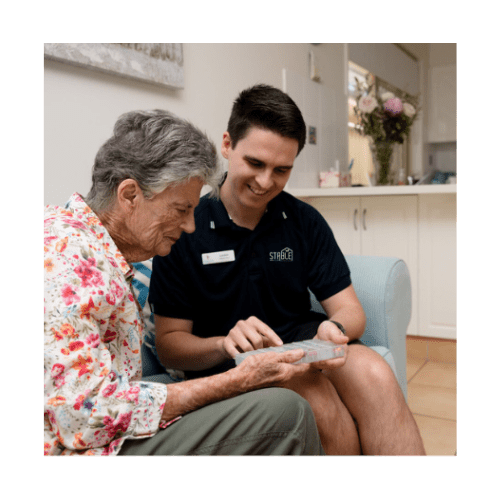Home Care Providers and NDIS Support Coordinators: How to Maximize Your In Home Care Experience
The Growing Need for In Home Care Givers: Factors Family Members Choose Expert Care Over Standard Facilities
The enhancing preference for at home caretakers over standard centers is a substantial fad reshaping the landscape of older care. Households are drawn to the benefits of customized treatment that lines up with private demands and preferences, permitting elders to preserve a feeling of autonomy in a familiar environment. This change also highlights the monetary and psychological factors to consider that influence decision-making. As we check out the myriad variables adding to this growing need, the effects for both caretakers and families end up being progressively obvious. What does this mean for the future of caregiving?
Customization of Treatment
Customization of treatment in home caregiving is crucial for fulfilling the distinct requirements of each individual (home care providers). This strategy ensures that treatment plans are customized to the details needs of the person, considering their case history, individual preferences, and lifestyle. By concentrating on the person's distinct situations, caregivers can cultivate a sense of dignity and freedom, which is often doing not have in even more institutionalized settings

Home caregiving allows for constant observation and adjustment of care strategies, making certain that modifications in health standing or personal choices are quickly dealt with. Eventually, individualized care in home settings dramatically contributes to the overall well-being of clients, making it an important element of contemporary caregiving methods.
Comfort of Home Atmosphere
The comfort of a home setting plays a critical function in the effectiveness of home caregiving. Lots of individuals, especially senior citizens, experience increased anxiety and anxiousness when put in unknown settings such as conventional care centers. Home caregiving supplies an acquainted environment, full of individual items, cherished memories, and the complacency that comes from being in one's very own area. This knowledge can considerably improve psychological health, which is crucial for healing and overall health and wellness.
In addition, the home atmosphere allows for a tailored technique to caregiving, suiting individual choices and regimens. Households can develop an environment that reflects their liked one's lifestyle, ensuring that care is delivered in a manner that really feels comfortable and all-natural. This personalized setting encourages far better interaction and interaction in between clients and caregivers, cultivating trust and connection essential for efficient treatment.
In addition, the comfort of home can promote social connections, as household participants and friends can see extra quickly, supplying vital emotional assistance. in home caregivers. On the whole, the home setting not only aids to keep dignity and freedom however likewise contributes to a greater high quality of treatment, making it a preferred choice for households seeking expert caregiving services

Improved Independence for Elders
Home caregiving not only gives comfort however likewise advertises improved self-reliance for senior citizens. Unlike conventional facilities, in-home care allows elders to maintain their daily regimens and involve in acquainted tasks within their very own environment. This autonomy is critical for their emotional health and total top quality of life.

Additionally, in-home caretakers can adapt their solutions to cater specifically to the unique demands of each elderly, promoting a greater sense of control. This versatility makes certain that seniors can appreciate their leisure activities, fraternize family members and pals, and continue to be energetic in their neighborhoods, additionally improving their feeling of self-reliance.
Inevitably, in-home caregiving not just addresses the physical requirements of elders but likewise encourages them to lead satisfying lives, making it a significantly popular selection for families seeking the finest treatment options for their loved ones.
Cost-Effectiveness of In-Home Treatment
In-home care uses a cost-efficient choice to standard nursing facilities, enabling family members to offer high quality assistance for their loved ones without incurring exorbitant costs. The costs linked with assisted living facility can be overwhelming, typically going beyond $100,000 each year, which can drain monetary sources rapidly. In contrast, in-home treatment solutions usually charge on a hourly or per-visit basis, making it possible for households to customize treatment plans according to their budget and certain needs.
Moreover, in-home care eliminates extra expenses associated with center living, such as area, board and transport, and various administrative fees. Families can pick to involve caretakers just when required, potentially lowering total expenses. A substantial benefit of at home treatment is the capacity to preserve personal routines, which can add to far better psychological well-being and reduce the demand for pricey clinical interventions arising from sudden way of life changes.
Insurance policy insurance coverage, consisting of lasting treatment insurance coverage, commonly includes in-home care services, additionally improving monetary ease of access (ndis support coordinator). On the whole, the cost-effectiveness of in-home care not just reduces the monetary problem on families yet additionally promotes an extra tailored strategy to care that lines up with specific choices and demands
Structure Stronger Family Links
Giving treatment in an acquainted setting fosters much deeper household connections, permitting enjoyed ones to actively join the caregiving process. At home view website care develops chances for families to involve meaningfully with their handicapped or senior relatives, promoting psychological bonds that can be difficult to accomplish in institutional setups. The presence of expert caretakers makes it possible for member of the family to concentrate on their relational roles rather than being strained by the physical demands of treatment.
In addition, in-home treatment allows family members to preserve their treasured regimens, which can diminish feelings of stress and anxiety and disorientation frequently related to moving to care centers. Shared dishes, familiar surroundings, and the comfort of home offer a sense of security that improves health and cultivates open communication.
Families can work together with caretakers to create personalized care strategies that mirror the private choices and demands of their loved ones. This collective strategy not just empowers the senior but likewise reinforces the family, as members share responsibilities and sustain one an additional via tough times. Ultimately, in-home care grows a caring setting where relationships can grow, boosting the quality of life for both receivers and caretakers.
Conclusion
The raising choice for in-home caretakers highlights a considerable shift in just how households approach elderly care. Individualized care strategies, the comfort of familiar environments, enhanced freedom for seniors, and cost-effectiveness jointly add to this fad. Furthermore, the participation of family participants in the caregiving process cultivates stronger links and support networks. As these variables line up, at home care becomes a compelling choice to conventional centers, eventually advertising the well-being and top quality of life for seniors.
Families are drawn to the advantages of customized care that lines up with private requirements and choices, permitting senior citizens to keep a feeling of freedom in an acquainted atmosphere.In-home care uses an economical alternative to traditional nursing facilities, enabling households to give quality support for their liked ones without sustaining outrageous expenditures. In comparison, at home treatment solutions generally charge on a per hour or per-visit basis, allowing family members to tailor treatment strategies according to their budget plan and particular needs.
At home treatment develops chances for families to engage meaningfully with their handicapped or elderly relatives, promoting psychological bonds that can be tough to accomplish in institutional settings.The boosting choice for at home caregivers highlights a substantial change in exactly how families click now come close to senior treatment.